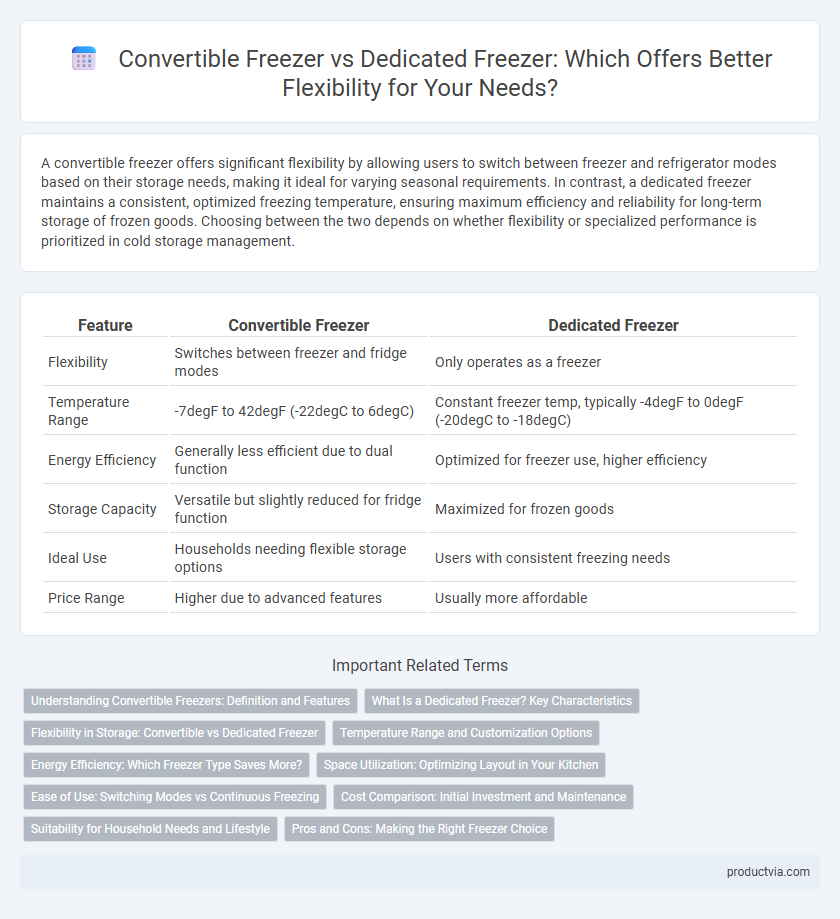A convertible freezer offers significant flexibility by allowing users to switch between freezer and refrigerator modes based on their storage needs, making it ideal for varying seasonal requirements. In contrast, a dedicated freezer maintains a consistent, optimized freezing temperature, ensuring maximum efficiency and reliability for long-term storage of frozen goods. Choosing between the two depends on whether flexibility or specialized performance is prioritized in cold storage management.
Table of Comparison
| Feature | Convertible Freezer | Dedicated Freezer |
|---|---|---|
| Flexibility | Switches between freezer and fridge modes | Only operates as a freezer |
| Temperature Range | -7degF to 42degF (-22degC to 6degC) | Constant freezer temp, typically -4degF to 0degF (-20degC to -18degC) |
| Energy Efficiency | Generally less efficient due to dual function | Optimized for freezer use, higher efficiency |
| Storage Capacity | Versatile but slightly reduced for fridge function | Maximized for frozen goods |
| Ideal Use | Households needing flexible storage options | Users with consistent freezing needs |
| Price Range | Higher due to advanced features | Usually more affordable |
Understanding Convertible Freezers: Definition and Features
Convertible freezers provide the flexibility to switch between freezer and refrigerator modes, adapting to varying storage needs with adjustable temperature settings typically ranging from -20degF to 50degF. These appliances often feature digital controls, reversible doors, and efficient insulation to maintain optimal conditions for different food types. Their versatility makes them ideal for users requiring customizable storage without the need for multiple units.
What Is a Dedicated Freezer? Key Characteristics
A dedicated freezer is a stand-alone appliance exclusively designed for freezing, maintaining consistent low temperatures to preserve food quality and prevent spoilage. It typically features a fixed temperature range optimized for long-term storage of frozen goods, without the option to switch to refrigeration mode. Key characteristics include enhanced insulation, precise temperature control, and specialized frost-free technology that ensure optimal performance for deep-freezing needs.
Flexibility in Storage: Convertible vs Dedicated Freezer
Convertible freezers offer superior flexibility in storage by allowing seamless switching between freezer and refrigerator modes, adapting to changing storage needs and various food types. Dedicated freezers maintain consistent temperature settings optimized for long-term freezing, ensuring maximum preservation but limited to frozen items only. This adaptability in convertible freezers makes them ideal for users requiring versatile storage solutions without compromising freezer efficiency.
Temperature Range and Customization Options
Convertible freezers offer a versatile temperature range, typically from -7degF to 39degF, allowing seamless switching between freezer and refrigerator modes to accommodate varying storage needs. Dedicated freezers provide a narrower, consistent temperature range optimized for deep freezing, usually between -10degF and 0degF, ensuring superior preservation for frozen goods. Customization options in convertible models include adjustable shelves and door storage, enhancing flexibility, while dedicated freezers focus on maintaining stable temperatures with fewer adjustable features.
Energy Efficiency: Which Freezer Type Saves More?
Convertible freezers offer the advantage of switching between freezer and refrigerator modes, but dedicated freezers are typically more energy-efficient due to optimized insulation and compressor settings for consistent low temperatures. Studies show dedicated freezers consume up to 20% less energy compared to convertible models, which must maintain dual cooling functions. For households prioritizing energy savings and environmental impact, dedicated freezers provide a more cost-effective and sustainable solution over time.
Space Utilization: Optimizing Layout in Your Kitchen
Convertible freezers offer superior space utilization by allowing users to switch between freezer and refrigerator modes, maximizing kitchen layout flexibility according to seasonal needs. Dedicated freezers maintain consistent freezing temperatures but require allocated space that may be less adaptable in tight kitchen designs. Choosing a convertible freezer enhances efficient use of limited kitchen space by consolidating functions without sacrificing storage capacity.
Ease of Use: Switching Modes vs Continuous Freezing
Convertible freezers offer ease of use by allowing quick switching between freezing and refrigeration modes, making them ideal for dynamic storage needs and minimizing downtime. Dedicated freezers provide continuous freezing at consistent temperatures, ensuring stable conditions for long-term preservation without manual adjustments. Choosing between them depends on the need for flexibility versus the reliability of uninterrupted freezing performance.
Cost Comparison: Initial Investment and Maintenance
Convertible freezers typically have a higher initial investment due to advanced technology allowing temperature adjustments between refrigeration and freezing modes, while dedicated freezers usually cost less upfront with specialized components for consistent freezing. Maintenance expenses for convertible freezers can be higher because of more complex systems prone to wear from frequent mode changes, whereas dedicated freezers benefit from simpler, robust designs that often result in lower ongoing repair and energy costs. When evaluating freezer options, businesses must weigh upfront capital savings against potential increases in long-term operational expenses to determine overall cost-effectiveness.
Suitability for Household Needs and Lifestyle
Convertible freezers offer enhanced flexibility by switching between freezer and refrigerator modes, making them ideal for households with fluctuating storage requirements or seasonal food preferences. Dedicated freezers maintain a consistent low temperature optimized for long-term food preservation, better suited for families that store large quantities of frozen goods regularly. Choosing between a convertible freezer and dedicated freezer depends on your household's lifestyle, storage habits, and the need for adaptable temperature control.
Pros and Cons: Making the Right Freezer Choice
Convertible freezers offer versatility by switching between freezer and refrigerator modes, making them ideal for fluctuating storage needs, but they may consume more energy and have slightly less efficient temperature regulation compared to dedicated freezers. Dedicated freezers provide consistent, optimized freezing conditions that maintain food quality over long periods, yet they lack the flexibility to adapt to refrigeration tasks. Choosing between a convertible freezer and a dedicated freezer depends on balancing the need for adaptability against energy efficiency and specialized performance.
Convertible freezer vs Dedicated freezer for flexibility Infographic

 productvia.com
productvia.com